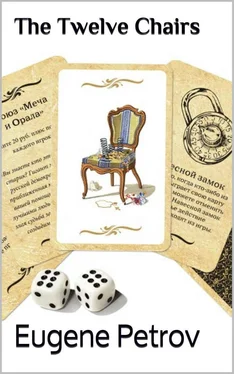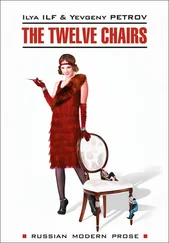Eugene Petrov - The Twelve Chairs
Здесь есть возможность читать онлайн «Eugene Petrov - The Twelve Chairs» весь текст электронной книги совершенно бесплатно (целиком полную версию без сокращений). В некоторых случаях можно слушать аудио, скачать через торрент в формате fb2 и присутствует краткое содержание. Год выпуска: 2013, Жанр: Юмористическая проза, на английском языке. Описание произведения, (предисловие) а так же отзывы посетителей доступны на портале библиотеки ЛибКат.
- Название:The Twelve Chairs
- Автор:
- Жанр:
- Год:2013
- ISBN:нет данных
- Рейтинг книги:5 / 5. Голосов: 1
-
Избранное:Добавить в избранное
- Отзывы:
-
Ваша оценка:
- 100
- 1
- 2
- 3
- 4
- 5
The Twelve Chairs: краткое содержание, описание и аннотация
Предлагаем к чтению аннотацию, описание, краткое содержание или предисловие (зависит от того, что написал сам автор книги «The Twelve Chairs»). Если вы не нашли необходимую информацию о книге — напишите в комментариях, мы постараемся отыскать её.
Find traces of a separate headset difficult and heroes face different adventures and troubles.
The Twelve Chairs — читать онлайн бесплатно полную книгу (весь текст) целиком
Ниже представлен текст книги, разбитый по страницам. Система сохранения места последней прочитанной страницы, позволяет с удобством читать онлайн бесплатно книгу «The Twelve Chairs», без необходимости каждый раз заново искать на чём Вы остановились. Поставьте закладку, и сможете в любой момент перейти на страницу, на которой закончили чтение.
Интервал:
Закладка:
pronouncement on the subject of medicine, looked around cautiously, and
said:
"Haemoglobin is what counts nowadays." Having said that, he fell
silent. The citizens also fell silent, each reflecting in his own way on the
mysterious power of haemoglobin.
When the moon rose and cast its minty light on the miniature bust of
Zhukovsky, a rude word could clearly be seen chalked on the poet's bronze
back.
This inscription had first appeared on June 15, 1897, the same day that
the bust had been unveiled. And despite all the efforts of the tsarist
police, and later the Soviet militia, the defamatory word had reappeared
each day with unfailing regularity.
The samovars were already singing in the little wooden houses with
their outside shutters, and it was time for supper. The citizens stopped
wasting their time and went their way. A wind began to blow.
In the meantime Claudia Ivanovna was dying. First she asked for
something to drink, then said she had to get up and fetch Ippolit
Matveyevich's best boots from the cobbler. One moment she complained of the
dust which, as she put it, was enough to make you choke, and the next asked
for all the lamps to be lit.
Ippolit Matveyevich paced up and down the room, tired of worrying. His
mind was full of unpleasant, practical thoughts. He was thinking how he
would have to ask for an advance at the mutual assistance office, fetch the
priest, and answer letters of condolence from relatives. To take his mind
off these things, Ippolit Matveyevich went out on the porch. There, in the
green light of the moon, stood Bezenchuk the undertaker.
"So how would you like it, Mr. Vorobyaninov?" asked the undertaker,
hugging his cap to his chest. "Yes, probably," answered Ippolit Matveyevich
gloomily. "Does the Nymph, durn it, really give good service?" said
Bezenchuk, becoming agitated. "Go to the devil! You make me sick!"
"I'm not doin' nothin'. I'm only askin' about the tassels and brocade.
How shall I make it? Best quality? Or how?"
"No tassels or brocade. Just an ordinary coffin made of pine-wood. Do
you understand? "
Bezenchuk put his finger to his lips to show that he understood
perfectly, turned round and, managing to balance his cap on his head
although he was staggering, went off. It was only then that Ippolit
Matveyevich noticed that he was blind drunk.
Ippolit Matveyevich felt singularly upset. He tried to picture himself
coming home to an empty, dirty house. He was afraid his mother-in-law's
death would deprive him of all those little luxuries and set ways he had
acquired with such effort since the revolution-a revolution which had
stripped him of much greater luxuries and a grander way of life. "Should I
marry?" he wondered. "But who? The militia chief's niece or Barbara
Stepanova, Prusis's sister? Or maybe I should hire a housekeeper. But what's
the use? She would only drag me around the law courts. And it would cost me
something, too!"
The future suddenly looked black for Ippolit Matveyevich. Full of
indignation and disgust at everything around him, he went back into the
house. Claudia Ivanovna was no longer delirious. Lying high on her pillows,
she looked at Ippolit Matveyevich, in full command of her faculties, and
even sternly, he thought.
"Ippolit Matveyevich," she whispered clearly. "Sit close to me. I want
to tell you something."
Ippolit Matveyevich sat down in annoyance, peering into his
mother-in-law's thin, bewhiskered face. He made an attempt to smile and say
something encouraging, but the smile was hideous and no words of
encouragement came to him. An awkward wheezing noise was all he could
produce.
"Ippolit," repeated his mother-in-law, "do you remember our
drawing-room suite?"
"Which one?" asked Ippolit Matveyevich with that kind of polite
attention that is only accorded to the very sick.
"The one . . . upholstered in English chintz."
"You mean the suite in my house?"
"Yes, in Stargorod."
"Yes, I remember it very well . . . a sofa, a dozen chairs and a round
table with six legs. It was splendid furniture. Made by Hambs. . . . But why
does it come to mind?"
Claudia Ivanovna, however, was unable to answer. Her face had slowly
begun to turn the colour of copper sulphate. For some reason Ippolit
Matveyevich also caught his breath. He clearly remembered the drawing-room
in his house and its symmetrically arranged walnut furniture with curved
legs, the polished parquet floor, the old brown grand piano, and the oval
black-framed daguerreotypes of high-ranking relatives on the walls.
Claudia Ivanovna then said in a wooden, apathetic voice:
"I sewed my jewels into the seat of a chair."
Ippolit Matveyevich looked sideways at the old woman.
"What jewels?" he asked mechanically, then, suddenly realizing what she
had said, added quickly:
"Weren't they taken when the house was searched?"
"I hid the jewels in a chair," repeated the old woman stubbornly.
Ippolit Matveyevich jumped up and, taking a close look at Claudia
Ivanovna's stony face lit by the paraffin lamp, saw she was not raving.
"Your jewels!" he cried, startled at the loudness of his own voice. "In
a chair? Who induced you to do that? Why didn't you give them to me?"
"Why should I have given them to you when you squandered away my
daughter's estate?" said the old woman quietly and viciously. Ippolit
Matveyevich sat down and immediately stood up again.
His heart was noisily sending the blood coursing around his body. He
began to hear a ringing in his ears.
"But you took them out again, didn't you? They're here, aren't they?"
The old woman shook her head.
"I didn't have time. You remember how quickly and unexpectedly we had
to flee. They were left in the chair . .. the one between the terracotta
lamp and the fireplace."
"But that was madness! You're just like your daughter," shouted Ippolit
Matveyevich loudly.
And no longer concerned for the fact that he was at the bedside of a
dying woman, he pushed back his chair with a crash and began prancing about
the room.
"I suppose you realize what may have happened to the chairs? Or do you
think they're still there in the drawing-room in my house, quietly waiting
for you to come and get your jewellery? " The old woman did not answer.
The registry clerk's wrath was so great that the pince-nez fell of his
nose and landed on the floor with a tinkle, the gold nose-piece glittering
as it passed his knees.
"What? Seventy thousand roubles' worth of jewellery hidden in a chair!
Heaven knows who may sit on that chair!"
At this point Claudia Ivanovna gave a sob and leaned forward with her
whole body towards the edge of the bed. Her hand described a semi-circle and
reached out to grasp Ippolit Matveyevich, but then fell back on to the
violet down quilt. Squeaking with fright, Ippolit Matveyevich ran to fetch
his neighbour. "I think she's dying," he cried.
The agronomist crossed herself in a businesslike way and, without
hiding her curiosity, hurried into Ippolit Matveyevich's house, accompanied
by her bearded husband, also an agronomist. In distraction Vorobyaninov
wandered into the municipal park.
While the two agronomists and their servants tidied up the deceased
woman's room, Ippolit Matveyevich roamed around the park, bumping into
benches and mistaking for bushes the young couples numb with early spring
love.
The strangest things were going on in Ippolit Matveyevich's head. He
Читать дальшеИнтервал:
Закладка:
Похожие книги на «The Twelve Chairs»
Представляем Вашему вниманию похожие книги на «The Twelve Chairs» списком для выбора. Мы отобрали схожую по названию и смыслу литературу в надежде предоставить читателям больше вариантов отыскать новые, интересные, ещё непрочитанные произведения.
Обсуждение, отзывы о книге «The Twelve Chairs» и просто собственные мнения читателей. Оставьте ваши комментарии, напишите, что Вы думаете о произведении, его смысле или главных героях. Укажите что конкретно понравилось, а что нет, и почему Вы так считаете.












